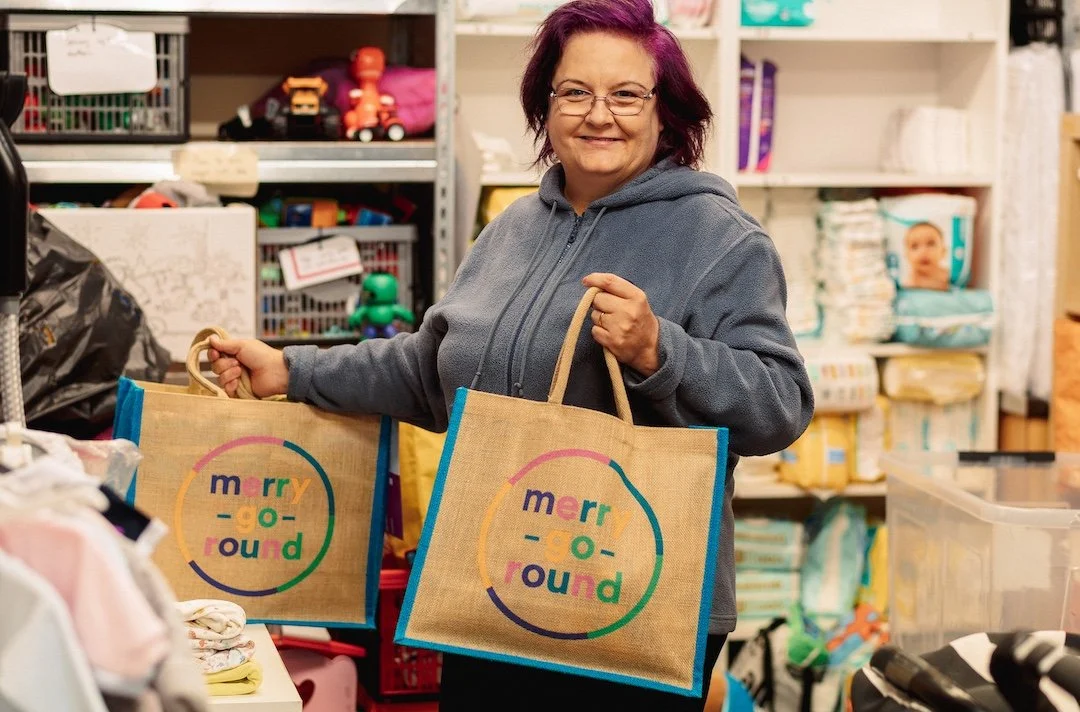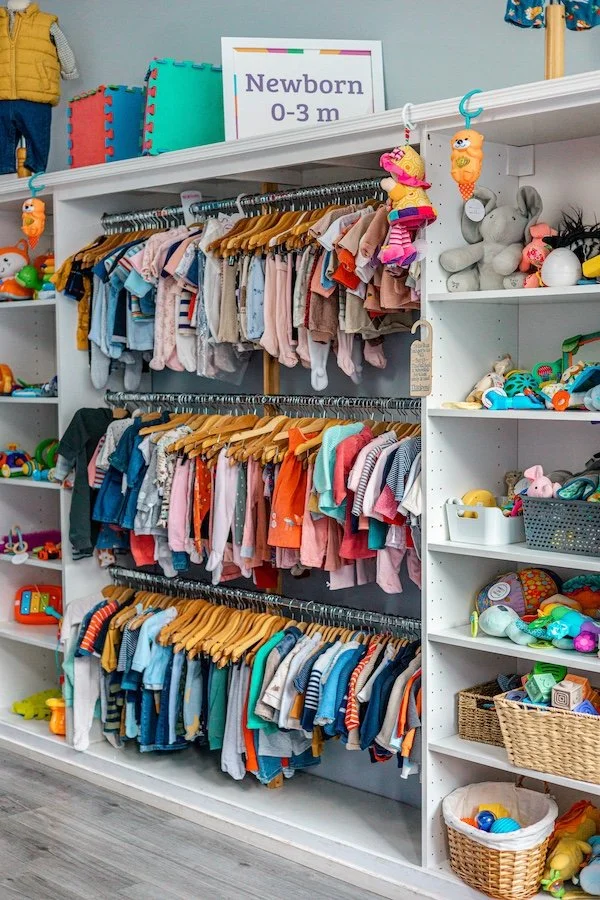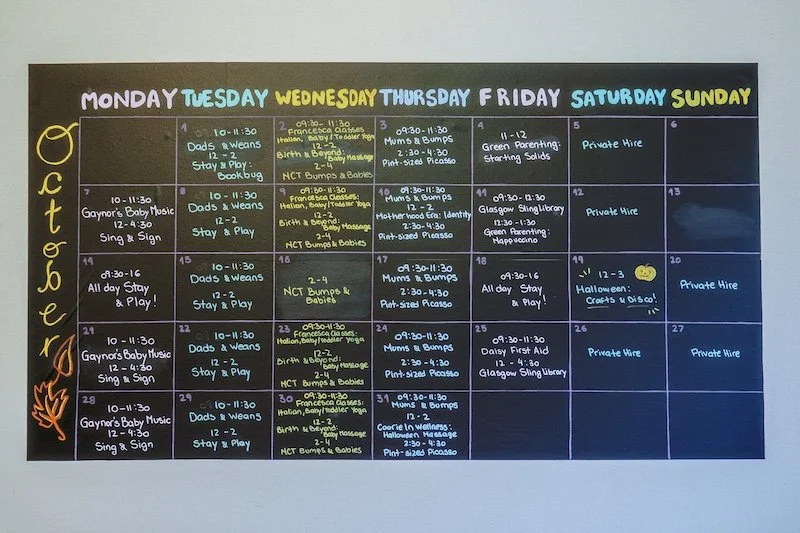From Babygrows to Big Change: How Southside’s Merry-go-round is giving baby gear a second spin
From fast-fashion to overconsumption, Merry-go-round’s Lauren Rankin writes about how baby steps can make big changes in families' lives, and how they offer a sustainable & affordable alternative to purchasing new.
By Lauren Rankin
Baby Steps, Big Change. That’s the belief behind Merry-go-round, a social enterprise based in Glasgow’s Southside helping families while tackling the climate crisis head-on.
Since opening in 2012, the team has rehomed over half a million baby and children’s items—saving more than 141 tonnes of good-quality clothes, toys and equipment from going to landfill.
Sam Moir, founder of Merry-go-round shares ‘Merry-go-round and everything we've achieved has surpassed all my original expectations. I'm so proud of our amazing staff and volunteers who put their heart and soul into our joint mission to support local families and protect the environment.’
As the cost of living continues to rise, more families are turning to Merry-go-round. From first-time parents trying to afford a pram, to families in crisis needing the basics fast, Merry-go-round offers practical support that makes a real difference.
“We see families come in every day,” says Jamie, a shop team member. “Sometimes it’s their first baby, sometimes they just need a bedtime book or a warm jacket. Being able to grab what they need without stress or pressure makes a big difference.”
The shop is stocked with essentials, from babygrows to buggies, all donated, all affordable. For those most in need, they offer a simple referral system called the Carousel Programme, getting vital items to families for free.
“Sometimes people just need help getting through a tough patch,” says the team. “The Carousel Programme lets us say yes, straight away, without putting families through extra hoops.”
One of the Carousel Partners has shared “Merry-go-round have been an extra life line to many families at what is an extremely stressful time in a parents life. Many of the families we work with will have limited resources, family networks or support - to be able to provide extra items of clothing and equipment is so helpful.”
But Merry-go-round isn’t just about supporting families—it’s about rethinking how we consume. “We set it up because we were seeing so much waste, and at the same time, so many families struggling to afford the basics,” says Sam. “We knew there had to be a better way—something that helped people and the planet at the same time.”
It’s often said that babies grow too quickly, and it’s true. Keeping up with their growing bodies can be expensive, and so many perfectly good items get thrown away long before they’re worn out. That’s exactly why Merry-go-round exists, to keep those items in use, make parenting more affordable, and reduce waste in the process. Every babygrow, buggy or book that’s passed on is one less thing going to landfill, and one less cost for a family trying to keep up.
Children outgrow seven clothing sizes in just two years. That’s a huge turnover in items that are often barely used.
“As a parent, I couldn’t believe how quickly we got through clothes,” says Lucia, Merry-go-round’s Events Coordinator. “You buy something thinking it’ll last a while, and suddenly it doesn’t even fit over their head. It adds up fast—money-wise and in waste. Sometimes it’s hard to let go of things that hold special memories, but knowing another wee one will get a second life from them makes it feel really worthwhile.”
When you mix that reality with a fast fashion industry pushing constant newness and cheap, disposable products, it’s no wonder families feel the pressure. Meanwhile, there are already enough children’s clothes in circulation to dress the next six generations. Yet production continues, and the message to buy more never stops. Kids’ clothing has become part of a throwaway system—one that harms both families and the environment.
There’s also the question, why are there even trends in baby clothes? Babies don’t care what they’re wearing, but the industry keeps pushing styles, colours, and collections like it’s a fashion show. Shopping second-hand breaks that cycle. It gives parents more freedom to dress their kids how they want, not how the high street tells them to. More colour, more choice, more creativity. No limits, and no waste.
Merry-go-round flips that model on its head. By keeping items in circulation and out of landfill, they offer a real, local solution to a global problem. Reuse doesn’t just save families money. It saves resources, reduces emissions, and gives us all a way to shop that feels better—for our wallets and for the world.
One standout example of their reuse work is the Scottish Baby Box mattresses. These are given to every new parent in Scotland, but many end up unused or barely touched. Most are binned after a few months. Merry-go-round actively collects these mattresses, checks them for safety, and rehomes them where appropriate. And when reuse in a home isn’t an option, they’ve found other smart solutions, like donating them to Glad Radio, a local community station that now uses the mattresses as soundproofing in their studio. It’s circular thinking at its best. “When Merry-Go-Round got in touch to tell us they had several dozen baby mattresses that we could potentially use, it took a moment to catch up with that level of lateral thinking, but it was a brilliant and greatly appreciated idea, and means we’re now making community podcasts with much improved acoustics in our uniquely appointed baby-mattress-lined padded cell, just round the corner from Merry-Go-Round in The Deep End.” Richard Bull, GLAD Radio.
They’ve also launched Roundabout, a rental service for baby equipment like buggies, cots, and car seats. It’s perfect for families who don’t want to commit to expensive purchases they’ll only use for a few months.
Rajkiran Atwal, Development Manager of Roundabout, said: "We know travelling with children can be both a whirlwind and costly, but it doesn’t have to mean buying items that only get used a handful of times. Roundabout helps families travel lighter while reducing waste—a win for parents and the planet.”
Roundabout is affordable, flexible, and extends the life of items that are otherwise outgrown or unused far too quickly. It makes sustainability easier and more accessible for everyone.
All of this ties back to Merry-go-round’s core message: that small, thoughtful actions can lead to real, lasting impact. Every babygrow passed on, every buggy reused, every mattress reimagined, it all adds up. It’s not about perfection. It’s about progress, and about doing what we can, where we are, with what we have.
And the demand is growing. Every week, more families come through the door. Volunteers sort and prep mountains of donations. Partner organisations send through referrals. The team works hard behind the scenes to make sure nothing is wasted, and everything that can be reused, is.
What I see every day,” says Lauren, Merry-go-rounds Community Engagement Office “is a group of people who truly care. It’s not just about sorting clothes or cleaning buggies—it’s about making a real difference for families and the planet. There’s a quiet passion here, a shared belief that even small actions add up to big change. That spirit keeps us going, no matter how busy it gets.”
Merry-go-round isn’t just a second-hand shop. It’s a climate action hub. A support service. A warm, welcoming space that proves sustainability and community care go hand in hand.
In a time when both parents and the planet are under pressure, this work matters more than ever. It shows that real change doesn’t always come from the top. Sometimes it starts with something as simple as sharing a babygrow.
Baby steps really can lead to big change.
This article has been paid for by Merry-Go-Round.



